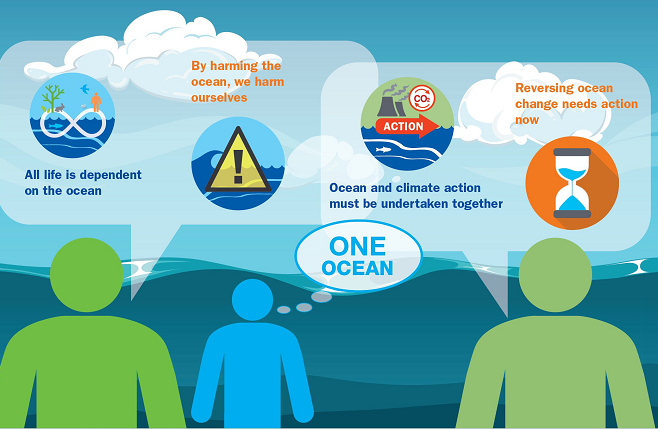Changing the ocean conversation

A new paper¹ by a team of international marine scientists calls for an urgent change in how we think and talk about the ocean in order to improve understanding and action in its defense.
The paper breaks ground in recognising how an effective use of language can change the trajectory of ocean decline. Providing recommendations for decision makers, scientists and NGOs in the ocean and climate fields, it makes six, scientifically informed points which everyone should understand and act on (read on for the full list).
 “Words, and how we express our connection to the ocean, clearly matter now more than ever before,” write the authors. They point to the absence of consideration of the ocean in most discussions about a post COVID world and believe that the global-scale policy change needed will not be forthcoming without an improved understanding and articulation of the role of the ocean in our lives.
“Words, and how we express our connection to the ocean, clearly matter now more than ever before,” write the authors. They point to the absence of consideration of the ocean in most discussions about a post COVID world and believe that the global-scale policy change needed will not be forthcoming without an improved understanding and articulation of the role of the ocean in our lives.
Although the health of the ocean is deteriorating swiftly and to the detriment of humankind, very little is done to address the situation. The authors hope that improving ocean literacy – understanding about the role of the ocean in our lives – will increase the attention paid to the ocean and the urgency with which action is taken.
The first step that the scientists point to is for the ocean to be recognised as a single entity. There is only one ocean, it has different areas with different habitats and names, but it is all connected and works as a whole to make all life on Earth possible. As such, it should only ever be referred to in the singular.
The report argues that we need a joined-up, whole ocean response to climate and biodiversity. The authors say that we need a ‘plan B for ocean recovery’ as downward step-changes in ocean health dramatically impact humanity. They call for a ‘Marshall-style’ plan for the ocean, akin to the ambition and drive used to rebuild societies after World War II.
The six narrative points:
- All life is dependent on the ocean
We are all creatures of the sea because our lives are entirely dependent on the healthy functioning of the ocean. Therefore, the first and most basic thing we need people to understand is that all life is dependent on the ocean – it nurtures us but we have done little to nurture it in return.
- By harming the ocean, we harm ourselves
Humanity hasn’t grasped that by harming the ocean we harm ourselves. If we were in a boat, we wouldn’t pound holes into the hull and expect to keep floating, yet we damage the life support system of our planet with almost total disregard.
By harming the ocean we harm ourselves – it is our life support system and we need to stop the damaging activities that will cost us more dearly that we realise.
- By protecting the ocean, we protect ourselves
Humanity’s reliance on the ocean means we must protect it to protect ourselves. If Earth is our spaceship, the ocean is our engine and we cannot survive without it.
- Humans, the ocean, biodiversity, and climate are inextricably linked
We learned during the pandemic that we are all connected, with each other and with nature. The ocean and climate and the biodiversity of the whole planet are inextricably linked with each other, with us and with our ultimate wellbeing. Our thinking and actions need to be as joined up.
- Ocean and climate action must be undertaken together
We will not effectively address the climate crisis until we recognise both the impact of it on the ocean and the solutions that lie there. Protecting the ocean should be climate policy.
Taking action on the climate without taking action on the ocean is like only fixing the holes on one side of a sinking ship.
- Reversing ocean change needs action now
The timescales at work in the ocean mean that much of the damage already in the ocean cannot be undone or stopped. Every day that we do not take action is another day we cannot get back and another dangerous step that cannot be untaken. We need to act now or risk closing off future options for action.
Read the full paper Visit the ipso website
¹ Evolving the narrative for protecting a rapidly changing ocean, post COVID-19 was published in the peer review journal Aquatic Conservation on 25 November 2020 and is also available on the IPSO website: http://www.stateoftheocean.org/science/current-work/
The Calouste Gulbenkian Foundation’s Valuing the Ocean programme is working to make connections and build relationships designed to help protect our ocean. We have been supporting organisations to test new ways of communicating why the ocean matters to help build communications capacity and create a new ‘sea story’ in the UK. Our focus has been both on the framing of messages and the means of engaging people.
